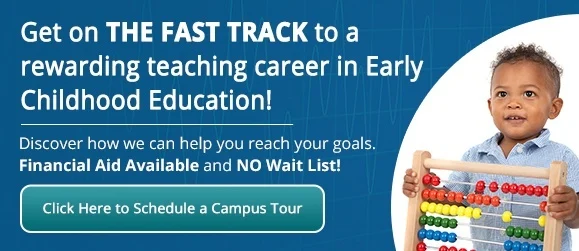Fulfilling Requirements for a Teacher Certification in Your State
Posted On September 3,2020

If you’re considering a career in Early Childhood Education (ECE), such as becoming a teacher, you likely have some questions about teaching certifications and what’s required of you before you’re able to start teaching in your state.
First, What is a Teacher Certification?
Teacher certification is the process by which prospective teachers or educators obtain their teacher licensing which allows them to teach within a given area, after completing required coursework, degrees, exams, and any other required criteria.
Learn More about Our Early Childhood Education ProgramAn early childhood education certificate demonstrates that a teacher has met a certain set of standards that show they understand the best methods to educate young students, typically between the ages of birth to 8.
Teachers can become certified to teach in whatever state they want, and even earn national certification, which is accepted in all 50 states, including the District of Columbia.
Check the Requirements in Your State
While all 50 states require that an individual must become certified before they are eligible to begin teaching, the process is slightly different in each state, so it’s extremely important to check the specific certification and licensing requirements in your state, or the state you want to teach in.
The Traditional Path to Obtaining Teacher Certification
If you already know which state you want to teach in, and have committed to earning your degree in early childhood education, and taking the traditional path to teaching in the classroom, here are the basic steps you must complete first:
1. Meet Educational Requirements
Enroll in an accredited early childhood education program to begin the process of earning your ECE degree, or Associate Degree in Applied Science (AAS) Majoring in Early Childhood Education.

2. Fulfill the Student Teaching Internship Requirements
This will vary per program and state, but if it’s required in order to complete the program, students must fulfill any student teaching internship requirements as well as any other certification requirements, such as First Aid, Adult and Infant CPR, Child Abuse Recognition and Prevention, and Communicable Disease, etc.
3. Pass State/National Competency Exams
Students must pass state and national competency exams, demonstrating their extensive knowledge of early childhood education.
4. Earn a State Teaching License or Certificate
Students must earn certification through the state board of education in the state they reside in or wish to teach in.
Teaching Reciprocity
Teaching reciprocity is the process of transferring a teacher certification to another state. It might put some prospective educators at ease to know that if they ever decide to move to a different state, it may still be possible to transfer their teaching certificate. Many states have reciprocity agreements which make it easier for teachers licensed in one state to become certified in another. There are currently over 40 states that have reciprocity agreements with at least one other state, however, many states consider this transfer process to be provisional only, meaning you would still be required to earn a new state license within a few years of teaching there.
Early Childhood Education Degree Programs
Deciding to enroll in an ECE program and earn a degree in early childhood education, gives prospective educators the unique opportunity to play a crucial role in the lives of students. As an early childhood educator, you’ll get to teach creative lesson plans designed to help the development of young children, as well as provide a foundation of a lifetime love for learning.
If you’re interested in becoming a teacher and would like more information about enrolling in an accredited ECE program, contact Athena Career Academy today to get started. You can talk with our admissions team and learn more about our programs. We look forward to helping you achieve your career goals.
Start Your ECE Process Now